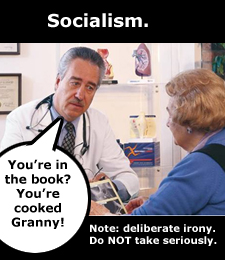Creeping anti-socialism.
I've heard reports today (Thursday) that the Obama administration is looking very seriously at pitching the "public option" component of their health care plan over the side, possibly  to gain a couple of (or, more likely, just one) Republican vote(s) in the Senate - votes that would probably be superfluous without the public option anyway. At this moment, I'm hoping this was just a trial balloon put up by an increasingly pusillanimous White House, but my common sense tells me that's not the case. The public plan was the ten-day-old soup bone tossed to the left in exchange for their acquiescence to the administration's decision not to even discuss adopting a single payer system; so, of course, the triangulators we've put in charge of our government consider this expendable, just as they consider progressives a block of votes they can take for granted. Stupid move, if true. The public option is all that's left of meaningful health insurance reform. Without that, we might as well not bother. The balance of the legislation will essentially require everyone to buy private insurance, with subsidies for those who cannot afford it, and that mandate would only benefit big fat private insurers. In fact, it would set things up so that whether the legislation passes or not, they would stand to win.
to gain a couple of (or, more likely, just one) Republican vote(s) in the Senate - votes that would probably be superfluous without the public option anyway. At this moment, I'm hoping this was just a trial balloon put up by an increasingly pusillanimous White House, but my common sense tells me that's not the case. The public plan was the ten-day-old soup bone tossed to the left in exchange for their acquiescence to the administration's decision not to even discuss adopting a single payer system; so, of course, the triangulators we've put in charge of our government consider this expendable, just as they consider progressives a block of votes they can take for granted. Stupid move, if true. The public option is all that's left of meaningful health insurance reform. Without that, we might as well not bother. The balance of the legislation will essentially require everyone to buy private insurance, with subsidies for those who cannot afford it, and that mandate would only benefit big fat private insurers. In fact, it would set things up so that whether the legislation passes or not, they would stand to win.
It doesn't take a genius to see what this entire debate is about. It's really just our national political parties bending heaven and earth to protect the profits of private health insurance companies, big pharma, and big private health care providers like Columbia/HCA. From their point of view, the current system works perfectly in that it accomplishes what it is designed to do - make them a lot of money. Over the last couple of years, as this system has progressively failed more and more millions of people, the health business magnates recognized a growing tide of public opinion in favor of reform and have acted swiftly to a.) co-opt it through pre-emptive agreements with the new administration, b.) water down any emerging proposals from congress, and c.) work to kill through lobbying and astroturf-style phony activism whatever compromised plan ultimately comes out of committee. And, of course, since so many of the players in both the executive and legislative branches partly owe their tenures to fat contributions from the health care industry, this is turning out to be a fairly effective strategy.
No one should expect it to be easy to prevail against extremely entrenched institutional interests such as these. Even so, it shouldn't be hard to explain to people the basic principles  of why a national health insurance plan would tend not only provide better coverage, but actually save money... and lots of it. This is often framed as an effort to "socialize" the health care industry by having the government - and the taxpayers - pay to cover the uninsured, who are more often than not portrayed as a.) lazy, b.) irresponsible, and/or 3.) selfish - a kind of "hand out", if you will. Here's the part that, frankly, makes us look dumb: the government (and taxpayers) already insure the most expensive people in the country to insure, namely the elderly (Medicare) and the poor (Medicaid, S-CHIP). Extending, say, Medicare to cover everyone, including young, healthy workers, would make the system better able to pay for itself and provide better care. How good is Medicare, really? Ask mom or grandma... if she's not too scared to talk to you because Glen Beck told her you may be a socialist.
of why a national health insurance plan would tend not only provide better coverage, but actually save money... and lots of it. This is often framed as an effort to "socialize" the health care industry by having the government - and the taxpayers - pay to cover the uninsured, who are more often than not portrayed as a.) lazy, b.) irresponsible, and/or 3.) selfish - a kind of "hand out", if you will. Here's the part that, frankly, makes us look dumb: the government (and taxpayers) already insure the most expensive people in the country to insure, namely the elderly (Medicare) and the poor (Medicaid, S-CHIP). Extending, say, Medicare to cover everyone, including young, healthy workers, would make the system better able to pay for itself and provide better care. How good is Medicare, really? Ask mom or grandma... if she's not too scared to talk to you because Glen Beck told her you may be a socialist.
Seriously, we've got elements of socialism right now, like the national highway system, Medicare, and Social Security. Chances are, if we add something similar to that short list, it may well prove as popular as these programs are.
luv u,
jp
Comments